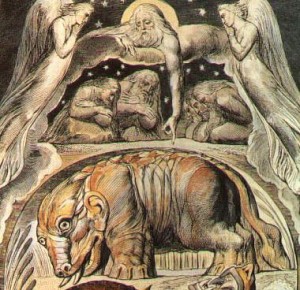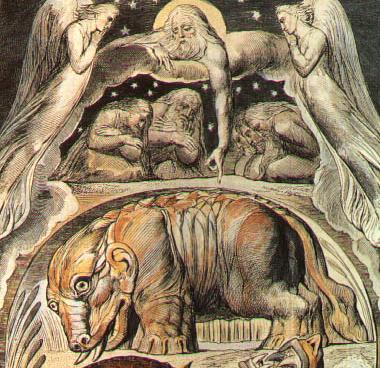בְּהֵמוֺת
 The word Behemoth that is used in our times for something enormous, especially for a big and powerful organization, is mentioned in the Hebrew bible as a primordial creature.
The word Behemoth that is used in our times for something enormous, especially for a big and powerful organization, is mentioned in the Hebrew bible as a primordial creature.
Job 40:15-24 (JPS translation):
Job 40:15 Behold now behemoth, which I made with thee; he eateth grass as an ox.
Job 40:16 Lo now, his strength is in his loins, and his force is in the stays of his body.
Job 40:17 He straineth his tail like a cedar; the sinews of his thighs are knit together.
Job 40:18 His bones are as pipes of brass; his gristles are like bars of iron.
Job 40:19 He is the beginning of the ways of God; He only that made him can make His sword to approach unto him.
Job 40:20 Surely the mountains bring him forth food, and all the beasts of the field play there.
Job 40:21 He lieth under the lotus-trees, in the covert of the reed, and fens.
Job 40:22 The lotus-trees cover him with their shadow; the willows of the brook compass him about.
Job 40:23 Behold, if a river overflow, he trembleth not; he is confident, though the Jordan rush forth to his mouth.
Job 40:24 Shall any take him by his eyes, or pierce through his nose with a snare?
The Behemoth has been identified as a mythological creature that cannot be defeated, just as the unconquerable monster Leviathan. Others believe it to be an elephant, a rhinoceros or crocodile or even a dinosaur of sorts. The BDB mentions it as a hippopotamus. The root בהמ is found also in other Semitic languages, e.g. Arabic and classical Ethiopic, with the meaning “to be dumb”.
The singular form בְּהֵמָה is a feminine noun that is used in the Hebrew bible for living creatures other than man, for domesticated animals and rarely also for wild beasts. The feminine plural on בְּהֵמוֺת does not designate the plurality of distinct beings in this case, but is used as the plural of intensity in order to intensify the meaning of Behemoth, the great beast. In Job 40:15 the word is used with a verb and possessive pronoun in the masculine singular.
